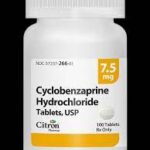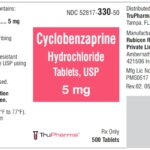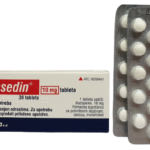Can I Take 2 Cyclobenzaprine 10mg At The Same Time?

According to the World Health Organization, medication adherence can have a more direct impact on patient outcomes than the specific treatment itself. Medication adherence can affect quality and length of life, health outcomes, and overall healthcare costs. Nonadherence can account for up to 50% of treatment failures, around 125,000 deaths, and up to 25% of hospitalizations each year in the United States.
Typically, adherence rates of 80% or more are needed for optimal therapeutic efficacy. However, it is estimated that adherence to chronic medications is around 50%.
What is Cyclobenzaprine?
Cyclobenzaprine belongs to the family of medications known as muscle relaxants. It is used along with rest and physical therapy for the relief of muscle spasm associated with acute (sudden and short-term) painful conditions. Muscle relaxants work in the central nervous system (CNS) to modify signals from the brain that cause the muscles to tighten. When used in combination with rest and physical therapy, muscle relaxants help to relieve the pain and stiffness caused by muscle spasm.
This medication may be available under multiple brand names and/or in several different forms. Any specific brand name of this medication may not be available in all of the forms or approved for all of the conditions discussed here. As well, some forms of this medication may not be used for all of the conditions discussed here.
Your doctor may have suggested this medication for conditions other than those listed in these drug information articles. If you have not discussed this with your doctor or are not sure why you are taking this medication, speak to your doctor. Do not stop taking this medication without consulting your doctor.
Do not give this medication to anyone else, even if they have the same symptoms as you do. It can be harmful for people to take this medication if their doctor has not prescribed it.
Can I Take 2 Cyclobenzaprine 10mg At The Same Time?
No, the usual adult dose of cyclobenzaprine is 10 mg 3 times a day, with a range of 20 mg to 40 mg a day (given in divided doses). The total dose should not exceed 60 mg daily. Use of this medication is not recommended for periods longer than 2 or 3 weeks.
Many things can affect the dose of medication that a person needs, such as body weight, other medical conditions, and other medications. If your doctor has recommended a dose different from the ones listed here, do not change the way that you are taking the medication without consulting your doctor.
It is important to take this medication exactly as prescribed by your doctor. If you miss a dose, take it as soon as possible and continue with your regular schedule. If it is almost time for your next dose, skip the missed dose and continue with your regular dosing schedule. Do not take a double dose to make up for a missed one. If you are not sure what to do after missing a dose, contact your doctor or pharmacist for advice.
In case of emergency/overdose
In case of overdose, call the poison control helpline at 1-800-222-1222. Information is also available online at https://www.poisonhelp.org/help. If the victim has collapsed, had a seizure, has trouble breathing, or can’t be awakened, immediately call emergency services at 911.
Symptoms of overdose may include the following:
• drowsiness
• fast or irregular heartbeat
• feeling agitated
• confusion
• trouble speaking or moving
• dizziness
• nausea
• vomiting
• hallucination (seeing things or hearing voices that do not exist)
• tremor
• loss of consciousness
Cyclobenzaprine Safety Information
You should not use cyclobenzaprine if you have an allergy to the medication, a certain type of thyroid disorder (hyperthyroidism), heart block, congestive heart failure, a heart rhythm disorder, or you have recently had a heart attack.
Do not use cyclobenzaprine if you have taken an MAO inhibitor in the past 14 days, such as isocarboxazid, linezolid, phenelzine, rasagiline, selegiline, or tranylcypromine.





